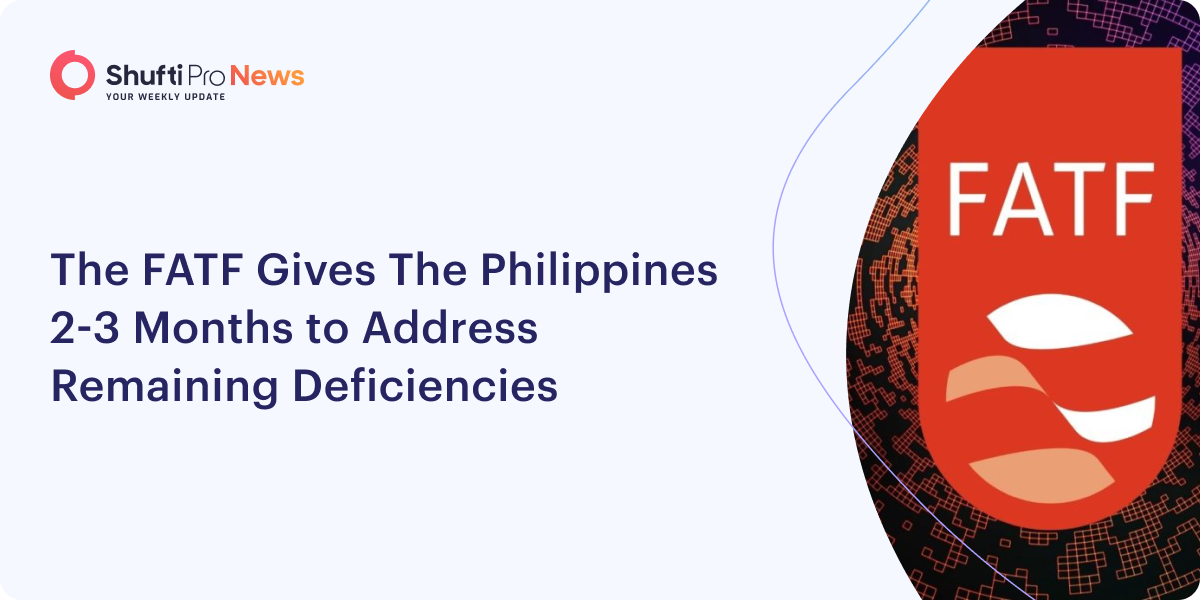The FATF Gives The Philippines 2-3 Months to Address Remaining Deficiencies

Chuchi G. Fonacier, Deputy Governor of the BSP, said 4 of the 8 remaining Financial Action Task Force (FATF) action plans have already been addressed. The remaining actions will be addressed within 2-3 months.
In a recent statement, the Deputy Governor of the Philippines’ Central Bank indicated 4 out of 8 FATF action plans had been addressed, with the remaining to be addressed within 2-3 months.
On July 20th, at the German-Philippine Chamber of Commerce and Industry’s economic forum, Fonacier stated, “Hopefully, maybe over the next two to three months, the remaining (action plans) will be addressed.” On the sidelines of the event, she added that the Philippine government expects to begin removing the Philippines from the FATF’s grey list by January 2024. Further adding, “We’re also collaborating with the Anti-Money Laundering Council (AMLC) to resolve the remaining deficiencies. As I said, four out of eight have already been addressed.”
Since June 2021, the global watchdog, FATF, has placed the Philippines on a grey list of countries undergoing increased monitoring to assess its progress in combating terrorist financing and money laundering.
The Philippines has committed to implementing 18 action plan items to be removed from the list. The FATF receives progress reports three times yearly – in January, May, and September. The FATF’s latest assessment of the Philippines in June recommended that it continue to develop action plans to correct strategic deficiencies related to the fight against money laundering.
In addition, supervisors have to demonstrate adequate anti-money laundering/counterterrorism financing (AML/CTF) tools and effective risk-based supervision. Additionally, the country needs to demonstrate increased investigations related to ML/TF and simplify the process of accessing beneficial ownership information by law enforcement agencies.
Aside from the Anti-Financial Account Scamming Act and the amendments to the Bank Secrecy Law, Fonacier stated that the Philippines would exit the grey list once these laws were enacted. By amending House Bill No. 7446, the BSP can investigate the bank employees’ and officials’ deposit accounts for fraud. The bill was approved in May by the House of Representatives. Additionally, lawmakers passed House Bill No. 7393 on first reading, prohibiting using electronic wallets and bank accounts for suspicious activities.
Fonacier further stated that banks attended BSP thematic reviews to address remaining deficiencies. A meeting between the BSP’s leadership, including then-BSP governor Felipe M. Medalla, and the FATF’s executive secretary Lucas P. Bersamin occurred earlier. Fonacier stated, “The executive secretary knows the urgency of addressing the FATF deficiencies. We’re optimistic we can address these.”
In April, the Supreme Court approved the Code of Professional Responsibility and Accountability, encouraging more lawyer reports of suspicious transactions or unlawful activities. As a result of underperformance in testing metrics over the last year, the AMLC also urged financial institutions to improve sanction screening systems.
Economic sanctions are identified through sanctions screening. The requirement applies to financial players and other industries that are regulated. All relevant parties must be screened against the UN Security Council resolutions and Anti-Terrorism Council lists.
Suggested Reads:
US FEDERAL RESERVE FINES DEUTSCHE BANK $186 MILLION FOR ANTI-MONEY LAUNDERING FAILURES
US AUTHORITIES SEIZE BAHAMAS BANK FOR LAUNDERING $58 MILLION











